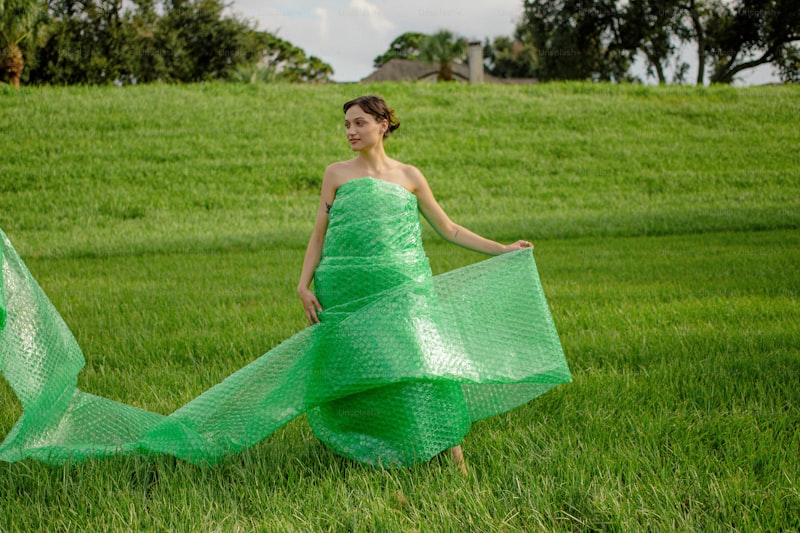Sustainable Materials in Wedding Dresses: A Guide to Eco-Friendly Fashion
In recent years, the wedding industry has seen a significant shift towards sustainability. As more brides become aware of the environmental impact of their choices, the demand for sustainable materials in Wedding dresses is on the rise. This article explores various sustainable materials, their benefits, and considerations for brides-to-be looking to make eco-friendly fashion choices on their special day.
Understanding Sustainable Materials
Sustainable materials are those that are sourced, produced, and designed to minimize their environmental impact. These materials can help reduce waste, lower carbon emissions, and promote ethical labor practices. When it comes to Wedding dresses, sustainable materials can range from organic cotton to recycled fabrics. Let's delve deeper into some popular options:
1. Organic Cotton
Organic cotton is grown without the use of synthetic pesticides or fertilizers, making it a safer choice for the environment and those who work with it. This fabric is breathable, comfortable, and ideal for various styles of Wedding dresses. Additionally, choosing organic cotton supports sustainable farming practices that prioritize soil health and biodiversity.
2. Linen
Linen is a natural fabric made from flax plants. It is biodegradable and has a lower environmental impact than many other materials. Linen is known for its durability and ability to wick moisture away, making it a practical choice for summer weddings. Its effortless drape also lends itself beautifully to elegant wedding dress designs.
3. Tencel (Lyocell)
Tencel is a sustainable fabric made from wood pulp that goes through a closed-loop production process, meaning that nearly all chemicals and water used are recycled. This soft, luxurious fabric is biodegradable and offers a beautiful drape, perfect for flowing Wedding gowns.
4. Recycled Fabrics
Another innovative option for sustainable Wedding dresses is recycled fabrics. These materials are created from post-consumer waste, such as plastic bottles and discarded textiles. Some designers utilize these fabrics to craft stunning gowns that minimize the need for new materials, thus reducing waste.
5. Vintage and Second-Hand Dresses
Opting for vintage or second-hand Wedding dresses is a fantastic way to embrace sustainability. By choosing a pre-loved gown, brides not only find unique pieces with character but also contribute to a circular fashion economy. This choice reduces the demand for new dress production and helps decrease overall textile waste.
| Material | Benefits | Considerations |
| Organic Cotton | Environmentally friendly, breathable | May require special care |
| Linen | Durable, moisture-wicking | Wrinkles easily |
| Tencel | Soft, biodegradable | Higher cost |
| Recycled Fabrics | Reduces waste, unique designs | Availability can vary |
| Vintage dresses | Unique style, supports circular economy | May require alteration |
Why Choose Sustainable Materials for Your Wedding Dress?
Choosing sustainable materials for your wedding dress comes with numerous benefits. Here are a few compelling reasons to consider:
- Environmental Impact: Traditional wedding dress production can be resource-intensive. By opting for sustainable materials, you contribute to reducing pollution, waste, and the overall carbon footprint associated with garment manufacturing.
- Unique Style: Sustainable fashion often embraces creativity and innovation. Many designers are crafting stunning pieces that stand out in style and ethos, allowing brides to express their individuality.
- Ethical Practices: Many sustainable material options come from brands committed to fair labor practices. By choosing these materials, you support ethical treatment of workers in the fashion industry.
- Longevity: Sustainable fabrics like organic cotton and Tencel are often more durable than their conventional counterparts. This means your wedding dress may withstand the test of time, allowing you to cherish it for years to come.
Considerations When Selecting a Sustainable Wedding Dress
While the prospect of wearing a sustainable wedding dress is exciting, there are a few considerations brides should keep in mind:
- Budget: Sustainable materials can sometimes come with a higher price tag due to ethical sourcing and production processes. It's essential to set a realistic budget that accommodates these factors without compromising quality.
- Availability: Not all bridal boutiques may stock dresses made from sustainable materials. Look for designers who specialize in eco-friendly fashion or consider custom options if you're struggling to find the right fit.
- Style and Comfort: Sustainability shouldn't come at the cost of comfort. Make sure to try on different fabrics to find one that feels good against your skin and complements your chosen style.

Conclusion
Choosing to use sustainable materials in Wedding dresses is an empowering decision that reflects a commitment to the environment and ethical practices within the fashion industry. While the journey towards finding the perfect eco-friendly gown may require some extra effort, the benefits are more than worth it. From organic cotton to recycled fabrics, there are plenty of options that ensure you can look stunning on your special day while being kind to the planet.
As you embark on your journey to find a sustainable wedding dress, remember to consider factors such as budget, availability, style, and comfort. Each eco-conscious choice you make not only helps reduce the environmental impact but also contributes to a more sustainable future for the fashion industry. Happy wedding planning!